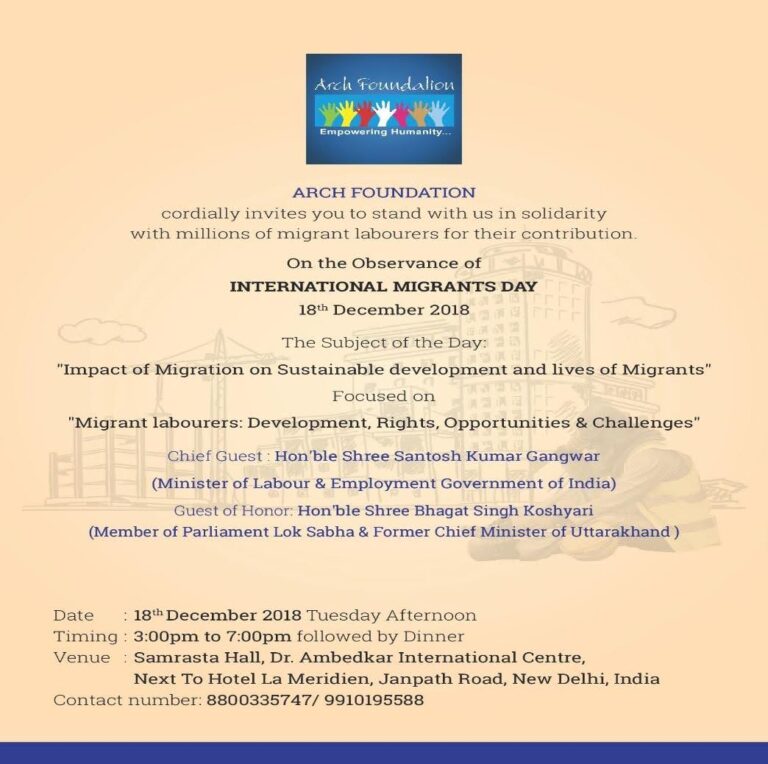Causes
Our Reach
Arch Foundation has worked across the country – reaching out to more than 50,000 women from some of the remotest rural villages. Presently, we are active in about 100 villages in these four states – Delhi, Bihar, Jharkhand and Uttar Pradesh.
- MIGRATION IS ONE OF OUR PRIORITY ISSUES
- NATIONAL AND INTERNATON SYMPOSIUM ON MIGRANT LABOUR (BY Arch Foundation)
- TRENDS OF INTERNAL MIGRATION AND DIFFICULTIES
- Our Approach: handholding with partners:
“Migrant labour community” – Migration Impact of Millions for Sustainable Development of Nation & their Impact on Worldwide!!
Migration for employment and its linkages with development has now emerged as a global issue which affects most nations in the world. It is high on the international, regional and national policy agendas. Through their labour, migrant workers contribute to growth and development in their countries of employment. Migration, especially migration of construction workers (often includes their families as well) is one of our priorities issues as that includes their rights violation and exploitation perpetrated by their unscrupulous employers.
“Migrant Workers are an asset to every country where they bring their labour. Let us give them the dignity they deserve as human beings and the respect they deserve as workers”
Juan Somavia
ILO Director-General
The ILO Decent Work Agenda promotes access for all to freely chosen employment, the recognition of fundamental rights at work, an income to enable people to meet their basic economic, social and family needs and responsibilities and an adequate level
of social protection for the workers and family members.
Considering the gravity as well as importance of migration, both international and national migration, especially its potential contribution to sustainable development, ARCH foundation proposes to organize a symposium on this vital issue. A short discussion on this subject is given below:
INTERNATIONAL MIGRATION: unlocks a host of opportunities for the individuals and countries involved. For instance migration represents for people access to employment, acquisition of skills and qualifications, improvement of life conditions, while for both countries of origin and destination it is a driver of growth and development. At the same time, as a process it is also marked by tremendous inequalities and serious human rights abuses. Targeted interventions would therefore be needed if the full potential of migration is to be explored and its negative aspects adequately addressed.
Countries of origin greatly benefit from their remittances and the skills acquired during their migration experience. Yet, the migration process also poses serious challenges. Many migrant workers, especially low skilled workers, experience serious abuse and exploitation.
Most international migration of skilled and unskilled labor from India is to Gulf countries while Indian professionals prefer highly developed countries (USA, Canada, Australia etc.) to migrate
INTERNAL MIGRATION:
Internal migration in India is driven by large regional inequalities. It is a vital component of poor people’s struggle for survival .A migrant laborer enjoys the least rights compared to other right-less workers and laborers. They have no bargaining power. This inequality is even more pronounced in unorganized labor market, where more than 95% migrant labors are employed. Consequently it adversely impacts not only their lives but all sustainable developmental efforts in the country. In India women and children face specific problems like trafficking for sex trade, bonded labor, child labor etc. which constitute major challenges to protection of human and labor rights. There is therefore an urgent need for a supportive legislative environment.
Internal migration: Current Situation:
- There are four times more internal migrants than international migrants
- Three out of ten Indians are internal migrants
- Internationally if we talk about; All Developing and countries where Infrastructures are on height, Mostly South Asia’ Countries impacted by Migration (For Constriction Workers) India is also comes on Priorities.
- Number of migrants in 2001 was 309 million which increased to 326 million by 2008 and approximately 400 million in 2017.
- Most internal out-migration is from Bihar, UP, and Uttarakhand to Metro Cities and States Like; Delhi, Karnataka, Haryana, Punjab, Maharashtra, and Gujarat within the nation. However, all states are vulnerable to International Migration, especially in Construction and Domestic Sector.
- Demand and need of Construction Workers and maids or Home-Helpers for domestic work has seen highest growth in recent years.
- The women recruited as maids are highly vulnerable to trafficking and exploitation.
- Un-Registered labours are unable to receive no pay or lass payment. They toil for long work hours, endure physical mistreatment and humiliation. There are so many issues to be taken care of.
Unorganized Sector: 95% of all internal migrants belong to unorganized sector and employed in the following trades:
- Construction Labour
- Domestic Security Guards
- Domestic Housemaids
- Retail Vendors
- Unorganized Labor In Retail Sector
According to some estimates women constitute 80% of total internal migrants. Of them, 30% are youth aged 15-29 years. Social Inclusion of Internal Migrants in India is major issue. They are considered outsiders everywhere.
Despite all difficulties, internal migration has grown over the years. In 2017 it has touched 400 million in India. Poverty and lack of work opportunities are the major driving forces. Internal migrants face discrimination as ‘outsiders’, which exclude them from access to legal rights, public services and social protection programmes accorded to residents. This is despite the migrants providing cheap labor, doing the most dirty, dangerous and degrading jobs that locals do not want to do. Far from being a burden on society, migrants’ cheap labor contributes to the national GDP. Moreover, remittances from migrants lead to increased expenditure on health and education helping human capital formation. Typical trends across the country include:
- 95% internal migrant workers are to be found in unorganized sector
- Movement to bigger villages and to urban pockets in search of work
- Shelters for poor migrants are in shanty colonies or slums
- Severe lack of basic infrastructure and medical facilities
- Lack of basic amenities as drinking water, fuel, electricity, housing etc.
- Prevalence of drug and substance abuse in poor migrant communities
- Prevalence of various forms of social, physical, mental, sexual and financial abuse.
- There is a lot of exploitation of migrant workers. They are clubbed with unskilled workers even if they have skills.
- Construction migrant workers are generally highly skilled, but they are not recognized as such.
(Government, National and International Organizations’ INGOs, Local Community Development Organization, Corporate’ under their CSR) –
1) Creating Opportunities for all men and women of working age, including migrant workers, to obtain decent and productive work in conditions of freedom, equity, security and human dignity.
1) Addressing the major issues faced by migration policy makers at National, regional and international levels.
2) Addressing the important themes of decent work for all, governance of migration, protection of migrant workers, promoting migration and development linkages, and expanding international cooperation.
3) Advocating gender-sensitive migration policies that address the special problems faced by women migrant workers.
4) Under PPP Model, establishment of tripartite consultative procedures between worker, government and Arch Foundation.
5) Promoting dialogue and consultation with employers’ organizations on practical opportunities and challenges they confront in the employment of foreign workers;
6) To help Corporate for their CSR initiatives on need based Technical and Management support to create new benchmark in CSR Sector for Sustainable Community Development (SCD)
What we do
- Networking with Grassroots NGO’s to support them in the area of program management and institutional development.
- Networking with Corporate to join hands for strategizing their CSR initiatives.
- Networking with Government, International and National Organizations for effective and sustainable program implementation.
What guides and motivates us in our work
- Millennium Goal and ARCH’s Vision and Mission
- Welfare Programs for labourers & their Family
- Education for All
- Health Promotion
- Program for differently able Persons
- Helping corporate houses in planning, designing and strategizing their CSR initiatives for greater impact and value for money
- Innovative program on Agriculture at village level and waste land management
- Safe Drinking Water and sanitation program
- Human rights initiatives
- Micro finance (SHG base) program to support Economy at grass roots level
- Advocacy for Gender equality


